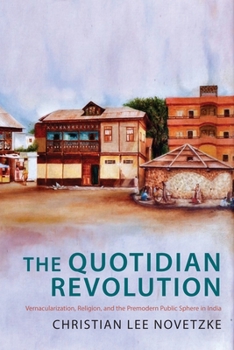The Quotidian Revolution: Vernacularization, Religion, and the Premodern Public Sphere in India
In thirteenth-century Maharashtra, a new vernacular literature emerged to challenge the hegemony of Sanskrit, a language largely restricted to men of high caste. In a vivid and accessible idiom, this new Marathi literature inaugurated a public debate over the ethics of social difference grounded in the idiom of everyday life. The arguments of vernacular intellectuals pushed the question of social inclusion into ever-wider social realms, spearheading...
Format:Hardcover
Language:English
ISBN:0231175809
ISBN13:9780231175807
Release Date:October 2016
Publisher:Columbia University Press
Length:432 Pages
Weight:1.55 lbs.
Dimensions:1.3" x 6.4" x 9.1"
Grade Range:Postsecondary and higher
Customer Reviews
0 rating





